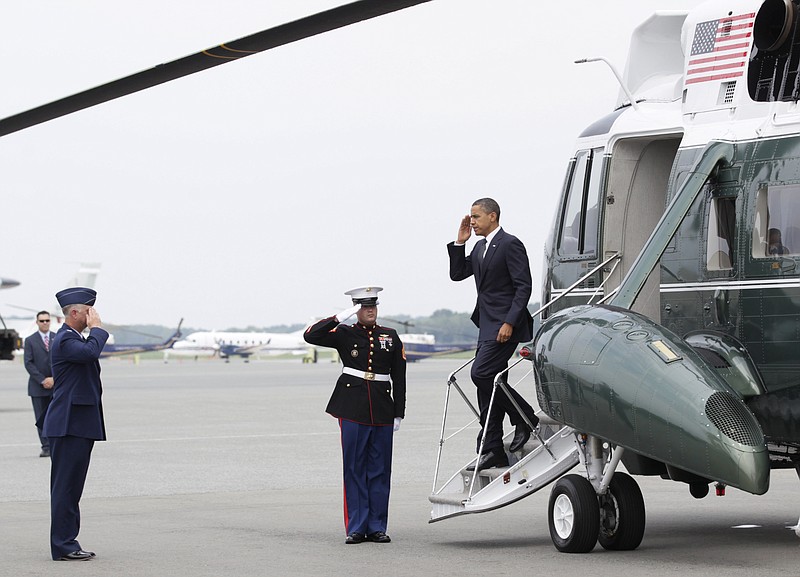DOVER AIR FORCE BASE, Del. (AP) - The fallen come home here with such dignity that every American flag on every case of remains is inspected for the tiniest smudge. The dead are treated with reverence by everyone. Including their commander in chief.
For the second time in his presidency, Barack Obama was at Dover on Tuesday, saluting troops who died on his watch.
Sadness hung everywhere. For Obama, it was a day to deal with the nation's single deadliest day of the decade-long war in Afghanistan. For the families of the 30 Americans who were killed, it was a time to remember the dreams their loved ones had lived, not the ambitions that died with them.
Obama solemnly climbed aboard the two C-17 cargo planes carrying the fallen home from Afghanistan. Their helicopter apparently had been hit by an insurgent's rocket-propelled grenade.
Later, the president consoled their grieving families.
The country didn't see it.
There will be no lasting, gripping images this time of Obama assuming his office's grimmest role. No family could give permission for media coverage, the military said, because no individual bodies had been identified yet.
The helicopter crash in Afghanistan on Saturday was that horrific.
The troops who died had been flying on a mission to help fellow forces under fire. An insurgent shot the helicopter down.
For Americans with no sons, daughters, other relatives or friends in the military, this punch seemed to blindside everyone. The war is supposed to winding down, and the face behind it, Sept. 11 mastermind Osama bin Laden, was killed months ago by elite U.S. forces.
Saturday's blow claimed 22 Navy SEALs from the same special forces team that pulled off the remarkable mission in Pakistan that ended bin Laden. None of those killed on the helicopter were part of the bin Laden raid, but the connection, along with the size of the loss, was deeply felt.
The troops who died were described as intensely patriotic, talented and passionate about the risks and responsibilities that came with their jobs.
Some were married with children. One wanted to be an astronaut. Another was going to propose to his girlfriend when he got home.
Three were from some the same Army reserve unit in Kansas: Bravo Company, 7th Battalion, 158th Aviation Regiment.
Seven Afghan commandos and one Afghan interpreter were killed, too, when the helicopter crashed in the Tangi Valley.
On Tuesday, 30 cases came off the planes draped in American flags; eight were covered in Afghan flags.
Obama watched as the cases were taken off the planes in a hangar, the White House said. He stood in salute as teams carried the cases, one by one, along a red carpet and into waiting vans.
Earlier, the president had met with about 250 family members and fellow servicemen and women of the dead. He spent about 70 minutes with family members, offering his condolences and gratitude for their sacrifice and service, the White House said. Defense Secretary Leon Panetta and Joint Chiefs Chairman Adm. Mike Mullen joined in.
The president flew by helicopter to Dover. The trip was kept private by the White House until he landed as a measure of security, although expectations of his presence were high from shortly after the 30 troops died.
Upon arriving, Obama boarded one plane carrying remains to pay respects, then did so again on the second plane.
The formal process of honoring the troops, known as a dignified transfer, rolled on across the afternoon. Reporters were kept out of sight in a nearby building.
Officials frown on calling the events a ceremony to avoid any connotation of celebration.
As described to reporters, the president and the rest of the official party, including military leaders, board the cargo planes. Then there is a prayer from a chaplain. Later, the remains are carried out.
The words "coffins" and "caskets" are never used. Instead, the fallen come home in transfer cases.
Teams on site ensure the cases come off the plane in perfect shape. They are carried down by personnel from each fallen member's service - and not just any troops but those specially chosen for the high honor.
Three days after the downing of the aircraft, the Defense Department has not released the troops' names. Officials say it is taking time because there were so many killed. Others say privately there is hesitancy to release the names because the majority were from sensitive special operations forces.

